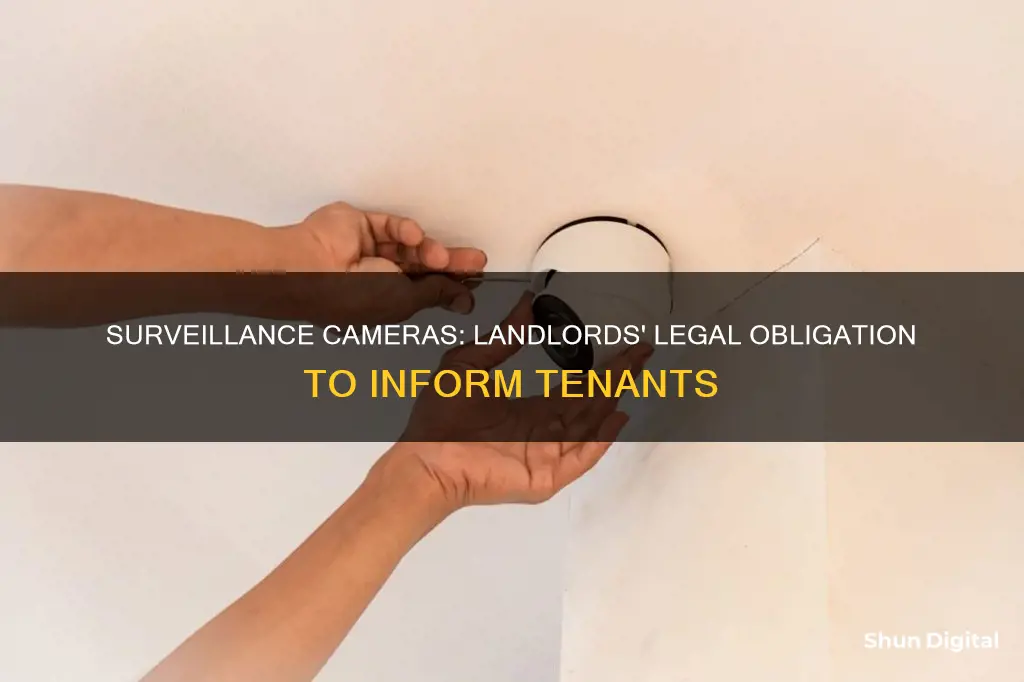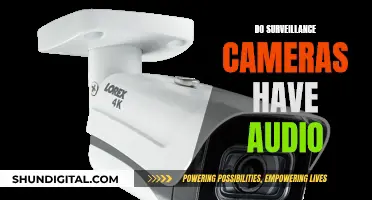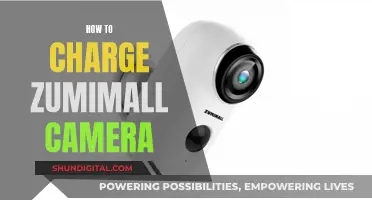
The use of surveillance cameras by landlords is a contentious issue, with privacy and safety being key considerations. While landlords have a limited right to install security cameras in common areas of rental properties, tenants' rights to privacy must be respected. This means that landlords cannot place cameras inside tenants' private spaces, such as their apartments or homes, as this may constitute tenant harassment. In common areas, such as hallways, shared entryways, and laundry rooms, landlords may install cameras, but they must be visible and not hidden, and tenants must be informed and consent to being recorded.
| Characteristics | Values |
|---|---|
| Legality of Landlords Installing Surveillance Cameras | Generally legal, but subject to certain conditions and local laws |
| Notification Requirements | Tenants must be informed of the presence of cameras and provide consent to being recorded |
| Camera Placement | Allowed in common areas without expectation of privacy, such as carports, stairwells, and shared hallways, Recreational areas, like pools or picnic areas. Not allowed inside tenant residences, shared bathrooms, changing rooms, or pointed at windows |
| Camera Type | Visible cameras only; hidden or spy cameras are prohibited |
| Audio Recording | Subject to stricter state audio recording laws and federal wiretapping laws; consent from both parties often required |
| Surveillance Footage Usage | Restricted to safety monitoring; using footage to spy or collect information on tenants is illegal and considered harassment |
What You'll Learn

Surveillance cameras in common areas are permitted
Surveillance cameras in common areas are generally permitted, as landlords have a limited right to use them in these areas. This is because tenants do not have a reasonable expectation of privacy in common areas.
Surveillance cameras can be placed in areas such as hallways, shared entryways, lobbies, stairwells, driveways, front doors, backyards, garages, and laundry rooms. The presence of cameras in these locations can help prevent break-ins, burglaries, and suspicious activities, thus ensuring the safety of tenants and their property.
However, it is important to note that the placement of cameras in certain areas can be considered an invasion of privacy. Landlords cannot install cameras inside tenants' units, including pointing cameras at their front doors. Additionally, interior surveillance cameras in private spaces such as bedrooms, bathrooms, and laundry areas are prohibited as they violate tenants' right to privacy.
To avoid any legal issues, landlords should be transparent about the presence of visible surveillance cameras in common areas and ensure that tenants' privacy expectations are respected.
Leasing Infrared Cameras: Understanding Finance Charges
You may want to see also

Landlords cannot record inside tenants' residences
While landlords may have a limited right to use surveillance cameras in common areas of rental properties, they cannot legally record inside tenants' residences. Tenants have a right to privacy inside their homes, apartments, or rented rooms. Landlords cannot use surveillance cameras to monitor tenants, their lifestyles, or their guests. Pointing cameras at tenants' private spaces, including their front doors, can be considered tenant harassment and may be grounds for legal action.
In the United States, several state laws, including those in Alabama, Arkansas, California, Delaware, Georgia, Hawaii, Kansas, Maine, Michigan, Minnesota, New Hampshire, South Dakota, and Utah, explicitly state that:
> "installation or use of any device for photographing, observing or overhearing events or sounds in a private place without permission of the people photographed or observed is considered a law-breaking behavior."
The placement of interior surveillance cameras or hidden cameras inside a rented property is a clear violation of tenants' privacy rights. This includes areas such as change rooms, bathrooms, bedrooms, and laundry areas. Additionally, audio recording laws are often stricter than video regulations, and in many states, both parties must be aware that an audio recording is taking place.
If a tenant feels that their landlord is using surveillance cameras to harass them, they should document the issue and communicate their concerns to the landlord in writing. While the landlord may not agree to remove the cameras, creating a written record of the situation can be crucial if legal action is pursued in the future.
Battery Chargers: Are They Included With Cameras?
You may want to see also

Surveillance cameras must be visible
The placement of surveillance cameras in rental properties is a complex issue that varies depending on local laws and regulations. While there may be benefits to both visible and hidden cameras, it is important for landlords to respect the privacy rights of their tenants and to use cameras solely for the purpose of security and not for tenant monitoring.
Visible surveillance cameras can act as a deterrent for potential intruders, reducing the likelihood of criminal activity. This is particularly effective in high-traffic areas such as entryways and hallways. Additionally, in public spaces, visible cameras can help address privacy concerns among visitors who do not wish to be recorded without their consent. However, some individuals may feel uncomfortable or violated by the constant monitoring that visible cameras entail.
Hidden cameras, on the other hand, can be beneficial in situations where discreet surveillance is required. For example, in the case of employee theft, a hidden camera can help identify the perpetrators without them being aware of the monitoring. Similarly, in retail stores, hidden cameras can capture instances of petty theft by customers. Hidden cameras are also less likely to be tampered with or vandalised.
However, it is important to note that placing hidden cameras in areas where individuals have a reasonable expectation of privacy, such as rented properties, can be considered a serious violation of privacy rights. Landlords must respect the privacy of their tenants and refrain from placing cameras inside tenants' units or in areas that directly monitor their front doors.
In conclusion, the decision to install visible or hidden cameras depends on the specific needs and goals of the landlord. Regardless of the type of camera chosen, it is crucial for landlords to comply with all relevant laws and regulations, respect the privacy rights of their tenants, and use the cameras solely for security purposes.
Uniview Cameras: Where Are They Manufactured?
You may want to see also

Audio recording laws are stricter than video regulations
While landlords have a limited right to use surveillance cameras in common areas of rental properties, tenants' rights to privacy must be respected. The placement of cameras in certain areas can constitute tenant harassment and even be grounds for legal action.
In terms of audio recording laws, these are indeed stricter than video regulations. In many states across the US, the installation or use of any device for recording audio in a private place without permission is considered illegal. Federal law requires the consent of at least one party before recording in-person, telephone, or electronic conversations. However, some states have more stringent "all-party consent" rules, where all participants must be aware of and consent to the recording.
The consequences of violating these audio surveillance laws can be severe, including substantial fines and imprisonment. For example, in Alabama, unlawfully recording a conversation can result in a penalty of up to $6,000 and a year in jail. Additionally, installing an eavesdropping device on private property can lead to a prison sentence of up to 10 years and a fine of up to $15,000.
To summarise, while video recordings are generally legal with or without consent, audio recordings require a higher level of consent and have stricter regulations to prevent violations of privacy.
Baltimore Traffic Camera Tickets: What You Need to Know
You may want to see also

Tenants can take down cameras in their private space
While landlords are permitted to install security cameras in common areas of a rental property, such as hallways, shared entryways, and laundry rooms, they cannot place cameras inside a tenant's private space, such as their apartment or home. Tenants have a legal right to privacy, and landlords cannot use surveillance cameras to monitor their tenants' activities, lifestyle, or guests.
If a tenant discovers that their landlord has installed hidden cameras inside their private space, they should first determine whether the cameras are functional and then carefully review their lease contract to see if any mention of surveillance cameras is made. If the landlord has indeed installed hidden cameras without the tenant's permission, the tenant has the right to demand that the landlord remove them immediately. If the landlord refuses to cooperate, the tenant should contact the local police and inform them that they have evidence that their landlord is spying on them.
In addition to taking down cameras in private spaces, tenants can also face legal repercussions if they feel their privacy has been invaded. Tenants who believe they are being harassed by surveillance cameras should carefully document the issue and write to their landlord requesting that the cameras be removed or adjusted to protect their privacy. While the landlord may decline, this creates a written record of the situation and can be used as evidence in a potential lawsuit. If the landlord is found liable for harassment, the tenant may be entitled to substantial compensation for any mental or emotional trauma caused.
In summary, tenants have the right to privacy in their private spaces, and landlords who install surveillance cameras in these areas are violating the law. Tenants can take down cameras in their private spaces and are advised to document any issues and seek legal assistance if they feel their privacy rights have been infringed upon.
BHS Camera Tickets: When Are They Issued?
You may want to see also
Frequently asked questions
Yes, landlords can install surveillance cameras in common areas such as hallways, stairwells, parking lots, and recreational areas. However, tenants must be informed of the cameras and consent to being recorded.
No, it is illegal for landlords to install surveillance cameras inside a tenant's residence or in any areas where privacy is expected, such as bathrooms, changing rooms, or laundry rooms.
If you feel that your landlord is using surveillance cameras to harass you, you should document the issue and write a letter to your landlord requesting the removal or adjustment of the cameras. You may also want to consult a tenant attorney to discuss your options.







